Proud to be “myself”

The motto of my school in New Delhi was “Be Yourself”. It sounded wonderful but I had no idea what being myself meant and sometimes still don’t know how to describe myself. Without turning this into an existential discussion, I would say I am a curious and argumentative brown woman who grew up in New Delhi and has chosen London as her home. Perhaps one example of the “Argumentative Indian” that Amartya Sen describes in his famous book of that name! I am incredibly fortunate to have a career where I can combine my interest in life science innovation and law. I am also part of a mixed-race family and hope my children grow up to be proud Londoners without their skin colour or names getting in the way.
Although I am very proud of all these facets of my heritage and identity, I want to focus on one aspect that involved a clear choice. I am proud to be a first generation immigrant. Being an immigrant meant leaving my country of birth and a culture where I knew all the rules for the excitement but also the discomfort of adapting to a new culture. The road has not always been smooth but I am so glad I chose London and the LSE as the starting point for my journey – both the city and the University are diverse multicultural melting-pots (some of these words have received quite bad press recently!). I was surrounded by different people from all over the world so it was easy to adapt. I may not have seen many people from a similar background to mine but I saw enough people from different races, cultures and backgrounds to help me feel that it was OK to be different and to be myself.
The world of work in London was more challenging to fit into in the early years and I don’t think it would come as a surprise to many that the Intellectual Property sector was much more traditional than the LSE. I expected, as a first generation immigrant, not to see many people who looked like me but what I found surprising was that others in the profession appeared to be very similar to each other in terms of cultural and socio-economic background or the academic institutions they had attended. These personal experiences solidified my belief that heterogenous groups are important for inclusivity.
Huge progress has been made in the last two decades in the Intellectual Property sector and we are beginning to see many more people from diverse backgrounds. The challenge for all of us now is to keep going and be as heterogenous as the society we are part of at all levels in the profession. Over the years, through my own increased self- confidence and with the support and friendship of many mentors and colleagues, I have also realised that we can find common ground with most people and heterogeneous groups thrive when members of the group are willing and take the time needed to understand each other. I hope I can be part of the solution at least by proudly being “myself”!
At EIP, we are committed to diversity and inclusion. We believe in equal opportunity in all areas and we are proud that diversity is a core part of our culture.

